Islam
Muslim and civil rights organizations say a New York Police Department program to secretly monitor Islamic communities has created so much fear and suspicion among Muslims that many find it impossible to lead normal lives.
A new 56-page report, “Mapping Muslims: NYPD Spying and its Impact on American Muslims,” details how the NYPD’s covert surveillance caused Muslims to refrain from activism and change their appearance so as not to appear too Muslim, and sowed suspicion among community members.
As a result, the Monday report asserts, trust between Muslims and police has broken down. The program, in which NYPD policemen secretly visited mosques, Muslim-owned businesses, and student and civic associations beyond New York’s five boroughs, was established in 2001 but uncovered by The Associated Press in 2011.
A spokesperson for the NYPD did not respond to a request for comment.

I read a lot of Trinitarian theology last semester at Duke Divinity school, most of it trying to discern how believing in a Triune God might affect the way people of different religious faiths relate to one another. The other great Monotheisms, Islam and Judaism, of course reject the Trinity as they reject Jesus as divine. But what if the Christian belief in the Triune God is the very basis on which Christians can accept Jews as Jews, Muslims as Muslims, and atheists as atheists? Different theologians have explored how the Trinity might be a good place to ground a Christian theory of religious pluralism. S. Mark Heim has gone so far as to say that God’s own inner diversity shows God’s intention for a diverse humanity, even including religious diversity. In other words: People might believe in a non-Trinitarian God because they were made by a Trinitarian God. Mind-blowing.
I wasn’t expecting to find resonance in Charles Darwin, whose name has been used in so much anti-religious fervor. But in his 1857 letter to Asa Gray, Darwin wrote about the “principle of divergence” and how “the same spot will support more life if occupied by very diverse forms.” We might not want to make a precise analogy to human society when Darwin concludes that “each new variety or species, when formed will generally take the place of and so exterminate its less well-fitted parent.”
That line of thinking could easily lead us to euthanasia. But, taken with his observation that diversity fosters life, we might say that co-existence with others forces a species to adapt, and everyone is better for it. Consider the converse of Darwin’s statement: The same spot will support less life if occupied by a unitary form. There is something life-giving – Heim might say “divine” – about difference.

On a summer night in a Western town of flat fields and hazy sunsets, a young woman stood outside a Greyhound bus with a ticket in her hand and a backpack over her shoulder. Boarding the bus, she said later, would be the hardest thing she had done in her 18 years.
Harder than saying a last goodbye to her mother, father, and five siblings that morning. Harder than the two years since as she tried to make a new life, alone, in a strange city.
Now 20, she asked to go by the name Samya. If her true identity were known, Samya believes, her family would seek her out and possibly kill her. They would certainly try to persuade her — if not force her — to come home.
Her parents, she said, think she is guilty of two serious crimes: She rejected a marriage arranged by her father, who came to the U.S. from the Middle East when Samya was an infant. And perhaps more serious to her parents: She has become an atheist.
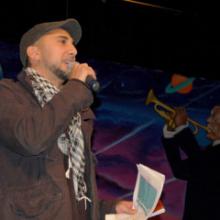
CHICAGO — Religious affiliation may be on the wane in America, a recent Pew study asserts, but you wouldn’t know it walking into the storefront near the corner of West 63rd Street and South Fairfield Avenue.
Inside a former bank in a neighborhood afflicted with gang violence, failed businesses and empty lots, a team of volunteers drawn by their religious faith is working to make life better for Chicago’s poorest residents.
The free medical clinic has expanded its hours; 20-something college graduates are clamoring to get into its internship program; rap stars swing by its alcohol-free poetry slams; and the budget has increased tenfold in the past decade.
The storefront belongs to Chicago’s Inner-City Muslim Action Network (IMAN) and it is part of a wave of new Muslim institutions emerging at an unprecedented pace. More than a quarter of the nation’s 2,106 mosques were founded in the last decade, according to a recent University of Kentucky study, and new social service organizations, many of them run by 20- and 30-something American-born Muslims, are thriving as never before.
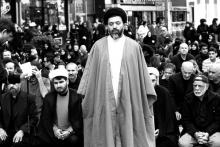
SPOKANE, Wash. — The Spokane Islamic Center wants something mosques all across the country are seeking and can’t seem to find: an educated, bilingual, experienced imam who understands American culture.
According to the report “The American Mosque 2011” by University of Kentucky professor Ihsan Bagby, half of all mosques in the U.S. have no full-time staff, and only 44 percent of imams work as paid, full-time leaders.
In Spokane, the Muslim community has been seeking a leader for 18 months and counting.
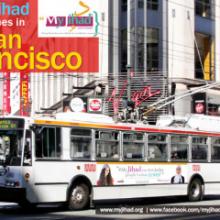
An ad campaign on San Francisco buses is aimed at trying to change public perception of the word “jihad,” which the program’s founder says has been distorted by extremists — Muslim and anti-Muslim alike.
Ahmed Rehab, a 36-year-old political activist, started the campaign in Chicago in December and expanded it to 25 San Francisco buses at the start of the year.
Rehab, who heads the Chicago office of the Council on American-Islamic Relations, says his MyJihad campaign, which defines jihad as a personal struggle in many areas of life, is aimed at reframing a debate over a word that has become synonymous in many quarters with armed struggle and terrorism.
He said the debate has been taken over “more or less by two extremes — Muslim extremists and anti-Muslim extremists.”
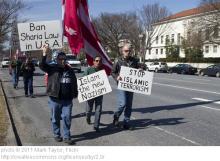
Many will remember pastor Terry Jones as the champion of the “Burn a Quran Day” event, intended to fan anti-Islamic rhetoric on the anniversary of the Sept. 11 attacks. Though many shouted him down and criticized his motives, he continues to have somewhat of a national platform for his agenda.
In this video produced by the New York Times, we get to witness what I consider a momentary intervention of God’s spirit in a beautifully, creatively nonviolent way. As Pastor Jones condemns Muslims and their religion, a man in the crowd pulls up the lyrics to the Beatles song, “All You Need is Love” on his phone. He stands next to jones and begins to sing, inviting the crowd to join in. It is beautiful because his hate is repaid with song, and the sting of his venomous words is neutralized without a hand or another voice being raised in anger (though I could do without the “idiot” sign, thanks).
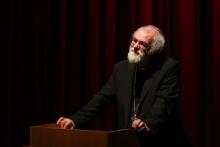
CANTERBURY, England — New figures from the 2011 Census show that the number of people who identify as Christians in England and Wales has fallen by 4 million over the last 10 years.
The data shows that numbers fell from 37.3 million in 2001 to 33 million last year.
The statistics came as the outgoing archbishop of Canterbury, Rowan Williams, claimed that English cathedral congregations are growing dramatically, challenging the claim made by secularists that the Church of England is fading in Britain.
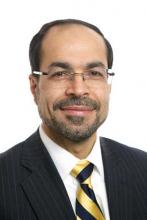
American Muslims are celebrating the ouster of two congressmen known for their anti-Islamic rhetoric, and heralding the outcomes as a sign that Muslim voters, at least in some districts, are a political force to be reckoned with.
"These encouraging results clearly show that mainstream Americans reject anti-Muslim bigotry by candidates for public office and will demonstrate that rejection at the polls," said Nihad Awad, executive director of the Council on American-Islamic Relations. "This election witnessed an increased political awareness and mobilization effort among American Muslims that dealt a major blow to the Islamophobia machine."
Republican Rep. Allen West lost to Democrat Patrick Murphy by about 2,500 votes in Florida’s 18th Congressional District, which includes Fort Lauderdale and West Palm Beach. West has not conceded, however, and has filed a motion to have paper ballots recounted.
There are roughly 160,000 Muslims in Florida, comprising about 0.9 percent of the population.
Over in Illinois, 21,000 votes separated Republican Rep. Joe Walsh from his successful Democratic challenger Tammy Duckworth, an Iraqi War veteran and double amputee. Illinois is home to the country's largest concentration of Muslims, about 360,000 comprising 2.8 percent of the population.
EARLIER THIS year, the Interfaith Partnership of metropolitan St. Louis held a public panel presentation addressing three Abrahamic religions—Judaism, Christianity, and Islam—on war and peace. Members of Interfaith Partnership and interested people from the community filled the chapel at Eden Theological Seminary to hear a Jewish scholar, a Muslim academic, and a Christian theologian (me) offer brief presentations on how our respective faith traditions value peace, as well as why, when, and how each religion views the use of violent force as sometimes morally justified.
During the question-and-answer period, I highlighted how in recent years both nonviolent and just war Christians have worked together on an approach, known as just peacemaking, for dealing with the underlying causes of war and thereby preventing its outbreak. As is often the case when I talk on this topic, most persons in the audience seemed unfamiliar with just peacemaking. After I attempted to clarify it further, someone asked the panel if other religious traditions had anything comparable to just peacemaking. The answer is yes, at least for Judaism and Islam, as shown in Interfaith Just Peacemaking, edited by Susan Brooks Thistlethwaite, a theologian and ordained minister in the United Church of Christ.
The 10 proactive practices that have been empirically proven as realistic and effective ways for preventing many wars form the framework for Interfaith Just Peacemaking. They were first identified in Just Peacemaking: The New Paradigm for the Ethics of Peace and War, edited by theological ethicist Glen H. Stassen. That book’s 23 contributors (scholars and practitioners from multiple disciplines—theology, political science, psychology, and history—and from pacifist and just-war perspectives) shared concerns about how just war has devoted insufficient attention to dealing with catalysts that lead to conflict (and not making war truly a last resort) and about how pacifism has failed to offer clear guidance about practical alternatives to war.
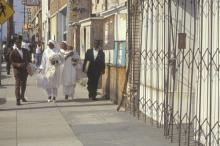
Nearly nine in 10 Muslim American voters pulled the lever for the Democratic candidate in the last two presidential elections, partly because of Republican policies and rhetoric that many considered anti-Muslim. In 2008, they also thought President Obama would usher in an era in which Muslims would be more accepted at home, and relations between America and the Islamic world would see improvement.
But this year, Muslim American support for President Obama shows signs of waning, which could be enough to affect the 2012 election in key swing states where a few thousand votes could have a big impact.
Several of those swing states -- most notably Virginia, Michigan, Florida, Pennsylvania, Colorado, and Ohio -- have enough Muslim voters to turn a tight race, experts say.
According to a poll of 500 Muslim American voters released Wednesday (Oct. 24) by the Council of American-Islamic Relations in Washington, 68 percent of Muslims said they would vote for President Obama, while 25 percent were undecided. The poll, which had a margin of error of plus or minus 5 percentage points, also found that 91 percent of Muslims intend to vote.

Responding to attacks on Muslims, Sojourners has been placing ads around the country with a simple reminder of Jesus' command regarding how we treat others. The billboards and subway ads read: “Love Your Muslim Neighbors.”
Now, the attacks have reached our nation’s capital. Pamela Geller and the American Freedom Defense Initiative’s hateful ads that refer to Muslims as “savages” were placed in Washington, D.C., Metro stations this week following a lengthy court battle. Sojourners was ready for this development and has purchased “Love Your Muslim Neighbors” messages that will be going up in the some of the same Metro stations targeted by the American Freedom Defense Initiative and should appear by the 15th of October.
The ongoing attacks against religious minorities both in the United States and around the globe are saddening and disturbing. You can help respond to the latest developments in DC by clicking here.
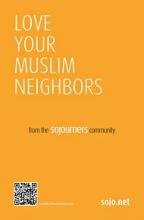
The racist, anti-Muslim ad in the New York Subway that used the language of civilized and savages has more than met its match.
A large group of Jews and Christians have countered that hateful message by tapping into the rich mines of neighborly love that are at the heart of Jewish, Christian, and Islamic traditions.
New ads by Rabbis for Human Rights , United Methodist Women, and Sojourners have tapped into the rich religious commandment to “love thy neighbor” to remind all of us to love our neighbors.

A house of worship in Ohio was hit by an arsonist this weekend, causing an estimated million dollars in damage. Services were rescheduled, members toured the building to see the destruction, and statements were made. The religious community felt targeted and was afraid of future attacks.
The fact that the space in question was the Islamic Center of Greater Toledo should not change our outrage. As Christians, we need to stand for religious liberty for people of all faiths. We need to love our neighbors and speak out against hate.
Soon after this weekend’s attack was made public, we put a plan into action to demonstrate our solidarity. As we have done in Missouri, Tennessee, and New York, we will be offering a simple, biblical message: “Love your Muslim neighbors.”
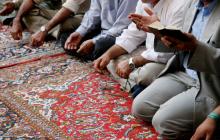
The variation in the proper way to pray is one among several differences that exist between Shiites, who make up about 15 percent of Muslims globally and in America, and the majority of Sunnis. Until recently, those differences mattered little in the United States, where the two groups bonded as Muslim minorities and prayed in the same mosques.
"There weren't enough of either to justify the cost of building sectarian mosques, and because in general, early generation immigrants were less focused on establishing formal houses of worship," said Andrea Stanton, a religious studies professor at the University of Denver.
That is changing, however, as American Shiites are increasingly establishing their own mosques. According to "The American Mosque 2011," a survey sponsored by several Muslim American organizations, 7 percent of roughly 2,100 mosques in America are Shiite, and most have been built in the last 20 years.
One reason: Shiites have become numerous and financially strong enough to manage the expensive process of buying or building their own mosques. Another factor: the growth in Shiite populations as immigrants flee persecution in Iraq, Bahrain, Saudi Arabia, Afghanistan, and Pakistan, where Taliban gunmen recently executed at least 22 Shiite bus passengers.
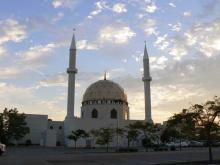
TOLEDO, Ohio — Muslim worshippers are reeling from an arson fire at the Islamic Center of Greater Toledo, but are grateful for an outpouring of support from the local interfaith community.
“All the support we get is very welcome because if you are going through a tragedy and you have a friend who is holding your hand it means a lot,” said S. Zaheer Hasan, a spokesman for theUnited Muslim Association of Toledo.
Perrysburg Township police ruled that the Sept. 30 fire was arson. Surveillance footage from the mosque shows a “person of interest” — a white middle-aged male wearing a camouflage sweatshirt and hat — at the mosque’s entrance shortly before the fire, which was reported about 5 p.m.
Mahjabeen Islam, president of the Islamic Center, said the suspect poured gasoline in the center of the main floor where men worship at the mosque. Women pray on the same main floor, but in an area separated by a low divider.
“It was set in the men’s prayer area and the sprinklers turned out the fire. There is a lot of water damage from the sprinklers,” Islam said. “The Islamic Center is uninhabitable for easily three months.”

It takes a lot for me to get excited.
Maybe I'm cautious, or maybe I'm just a tough sell, but it takes a big something to get me on board.
Today was that big something.
Last week, Pamela Geller of the Freedom Defense Initiative and Stop Islamization of America, put up ads in New York City subway stations that read, "In any war between the civilized man and the savage, support the civilized man. Support Israel. Defeat Jihad."
Well, I think that's a problem. And Sojourners thinks that's a problem.
Our world is a powder keg, and Geller flagrantly lit a blowtorch with these ads, which, in case you were wondering, are protected fully under the Constitution.
They may be legal, but they're not moral.
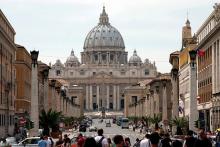
Just one week after Pope Benedict XVI ended his successful visit to Lebanon, the country's most senior Catholic leader called for a United Nations resolution “that will ban denigrating religions.”
Meanwhile in Pakistan, the country's only Catholic cabinet member, Minister of Harmony Paul Bhatti, this week told an interfaith gathering in Lahore that he will press U.N. Secretary General Ban Ki Moon to pass a UN resolution that condemns "defamation and contempt against religions." Bhatti said "we must not allow anyone to break our harmony" between Christians and Muslims.
Both moves are understandable in light of increasingly popular efforts in predominantly Muslim countries to outlaw blasphemy or defaming religion. But they could prove problematic for the Vatican as it fights to protect the rights of Christian minorities around the world.
The debate suggests a widening gap between the Vatican's official position, which opposes such measures, and the day-to-day reality of Catholic leaders on the ground, who often feel compelled to support Muslim efforts to protect religious tenets and religious figures from defamation.

The most recent discussions of U.S. foreign policy and the Middle East, once again say more about politics during an election year, than they do about the fundamental issues we must confront if we want to see substantial change.
So let’s look at the basic issues and fundamental choices we need to make.
Today the Middle East — where about 60 percent of the population is under the age of 25 — is a region dominated by humiliation and anger.
Failure + rage + the folly of youth = an incendiary mix.
The roots of anti-American hostilities in the Middle East run deep (literally and figuratively). We can start with the fact that our oil (and its economy) lies beneath their sands. Couple that with U.S. support of repressive and backward regimes, the continual presence of foreign troops on their land and in their holy places, and the endless wars waged there, ultimately fueled by the geopolitics of energy.
Add to that incindiary cocktail the unresolved Israeli/Palestinian conflict, which continues to drive the deepest emotions of mutual frustration, fear, and retaliation throughout the Middle East and the rest of the world.
Injustices and violence caused by the oil economy have sparked a reaction from dangerous religious fundamentalists in the Islamic world. Fundamentalism — in all our faith traditions — is both volatile and hard to contain once it has been unleashed, and it becomes hard to reverse its essentially reactive and predictably downward cycle.
Members of the Syrian opposition generally want a democratic government that protects the rights of minorities, though many also want a constitution based on Islam, according to a recent survey.
Their aspirations are important because the Obama administration has said it is refraining from arming the opposition, which has been pummeled by Syrian security forces for 18 months, in part out of fear of igniting sectarian violence. There's also fear that weapons would reach Islamist radicals who would threaten allies in the region.
The survey by the International Republican Institute, which trains democracy activists around the world, found high support for a government that "respectfully acknowledges religion" and treats all religions equally. The second-most popular model of choice was for a constitution "based on Islam."
"Most of the opposition is Sunni Muslims and they are democratically minded, but they want a government based on some kind of Islamic law or that follows Islamic guidelines," says Elizabeth O'Bagy, an analyst at the Institute for the Study of War who helped the survey writers find contacts in the opposition movement.